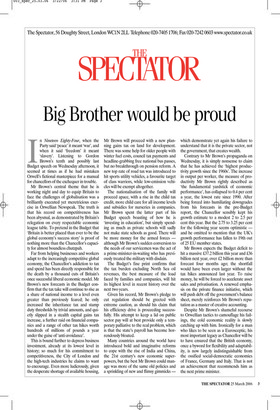Big Brother would be proud
In Nineteen Eighty-Four, when the Party said ‘peace’ it meant ‘war’, and when it said ‘freedom’ it meant ‘slavery’. Listening to Gordon Brown’s tenth and possibly last Budget speech on Wednesday afternoon, it seemed at times as if he had mistaken Orwell’s fictional masterpiece for a manual for chancellors of the exchequer in trouble.
Mr Brown’s central theme that he is working night and day to equip Britain to face the challenges of globalisation was a brilliantly executed yet meretricious exercise in Orwellian Newspeak. The truth is that his record on competitiveness has been abysmal, as demonstrated by Britain’s relegation on every respectable economic league table. To pretend in the Budget that ‘Britain is better placed than ever to be the global economy’s success story’ is proof of nothing more than the Chancellor’s capacity for almost boundless chutzpah.
Far from helping businesses and workers adapt to the increasingly competitive global economy, the Chancellor’s addiction to tax and spend has been directly responsible for the death by a thousand cuts of Britain’s once successful liberal economic model. Mr Brown’s new forecasts in the Budget confirm that the tax take will continue to rise as a share of national income to a level even greater than previously feared; he only increased the inheritance tax and stamp duty thresholds by trivial amounts, and quietly slipped in a stealth capital gains tax increase, a further raid on financial companies and a range of other tax hikes worth hundreds of millions of pounds a year under the guise of ‘anti-avoidance’.
This is bound further to depress business investment, already at its lowest level in history; so much for his commitment to competitiveness, the City of London and the high-tech industries he claims to want to encourage. Even more ludicrously, given the desperate shortage of available housing, Mr Brown will proceed with a new planning gains tax on land for development. There was some help for older people with winter fuel costs, council tax payments and headline-grabbing free national bus passes, but no breakthrough on pension reform. A new top rate of road tax was introduced to hit sports utility vehicles, a favourite target of class warriors, while low-emission vehicles will be exempt altogether.
The nationalisation of the family will proceed apace, with a rise in the child tax credit, more child care for all income levels and subsidies for nurseries in companies. Mr Brown spent the latter part of his Budget speech boasting of how he is ‘investing in education’, but simply spending as much as private schools will sadly not make state schools as good. There will be more money for the armed forces although Mr Brown’s sudden conversion to the needs of our servicemen was the act of a prime-minister-in-waiting who has previously treated the military with disdain.
The Budget’s fine print confirms that the tax burden excluding North Sea oil revenues, the best measure of the load faced by families and companies, will hit its highest level in recent history over the next two years.
Given his record, Mr Brown’s pledge to cut regulation should be greeted with extreme caution, as should his claim that his efficiency drive is proceeding successfully. His attempt to keep a lid on public sector pay will at best provide only a temporary palliative to the real problem, which is that the state’s payroll has become horrendously bloated.
Many countries around the world have introduced bold and imaginative reforms to cope with the rise of India and China, the 21st century’s new economic superpowers, but the best Mr Brown could manage was more of the same old policies and a sprinkling of new and flimsy gimmicks — which demonstrate yet again his failure to understand that it is the private sector, not the government, that creates wealth.
Contrary to Mr Brown’s propaganda on Wednesday, it is simply nonsense to claim that he has achieved the ‘highest productivity growth since the 1960s’. The increase in output per worker, the measure of productivity Mr Brown rightly described as ‘the fundamental yardstick of economic performance’, has collapsed to 0.4 per cent a year, the lowest rate since 1990. After being forced into humiliating downgrades from his forecasts in the pre-Budget report, the Chancellor sensibly kept his growth estimate to a modest 2 to 2.5 per cent this year. But the 2.75 to 3.25 per cent for the following year seems optimistic and he omitted to mention that the UK’s growth performance has fallen to 19th out of 25 EU member states.
Mr Brown expects the Budget deficit to hit a massive £37.2 billion this year and £36 billion next year, over £2 billion more than forecast four months ago; the shortfall would have been even larger without the tax hikes announced last year. To raise money, he will be forced to accelerate asset sales and privatisation. A renewed emphasis on the private finance initiative, which will push debt off the government’s balance sheet, merely reinforces Mr Brown’s reputation as a master of creative accounting.
Despite Mr Brown’s shameful recourse to Orwellian tactics to camouflage his failings, the cold economic reality is slowly catching up with him. Ironically for a man who likes to be seen as a Eurosceptic, his most important legacy as Chancellor will be to have ensured that the British economy, once a byword for flexibility and adaptability, is now largely indistinguishable from the ossified social-democratic economies of France, Germany and Italy. That is not an achievement that recommends him as the next prime minister.























































 Previous page
Previous page